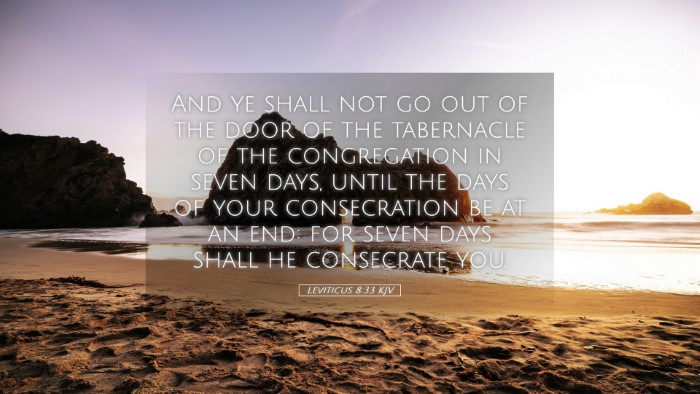Commentary on Leviticus 8:33
Verse Context: Leviticus 8:33 states, “And you shall not go outside the door of the tent of meeting for seven days, until the days of your ordination are completed, for your ordination will take seven days.” This verse is situated within the broader context of the ordination of Aaron and his sons into the priesthood. This moment is pivotal as it marks the establishment of the Levitical priesthood, a critical element in the religious life of Israel.
Historical Context
The Book of Leviticus serves as a manual for the Israelites in worship, priestly duties, and holiness. Leviticus 8 describes the consecration of the priests, emphasizing their sacred responsibilities. The period of seven days for their consecration has profound symbolic significance reflecting completeness and perfection in Hebrew tradition.
The Significance of Ordination
Matthew Henry notes that ordination signifies a divine appointment for a sacred duty. This process is not merely ritualistic but establishes a serious responsibility that the priests must bear before God and the people. The patience required during the seven-day preparation underscores the seriousness of their roles.
Albert Barnes' Insights
Albert Barnes emphasizes the importance of the ordination rituals, suggesting that these rites set a standard for spiritual leadership. The priests were to embody holiness because their lives were integrally tied to the worship of God among the Israelites. Their separation during the ordination period reflects a critical aspect of being consecrated unto God.
Adam Clarke's Reflections
Adam Clarke provides a theological perspective on the necessity of preparation for service in God’s house. He argues that the lengthy period of waiting signifies that God wishes to instill a sense of reverence and awe in His ministers. This dedication ultimately prepares them for the weighty task of intercession on behalf of the people.
Spiritual Implications
The ordination period signifies not only the physical preparation of the priests but also the spiritual transformation required to serve in God’s presence. Pastors and theologians can draw parallels between this ancient practice and contemporary preparations for ministry today. The emphasis on time spent in spiritual formation is a vital lesson for modern discipleship.
The Role of Separation
The instruction to not depart the tent of meeting encapsulates the notion of separation unto God. This implies that effective ministry flows from a place of intimacy with God. Henry elaborates on the idea that one must dedicate oneself fully to the service of God, finding refuge in His presence before engaging with the community.
Key Takeaways for Modern Ministry
- The Necessity of Preparation: Just as the priests underwent a rigorous process of consecration, today’s leaders should engage in thorough preparation of their heart, mind, and spirit.
- Understanding of Holiness: Ministers are called to a higher standard of living; they must lead lives that reflect God’s holiness to influence congregations effectively.
- Commitment to Service: The time of separation highlights the commitment required in spiritual leadership. Ministers must prioritize their relationship with God to serve effectively.
- Symbolism of Seven Days: The number seven represents completion, reminding us that God equips His servants fully for the work ahead.
Conclusion
Leviticus 8:33, while specific to the ordination of Aaron and his sons, provides timeless principles applicable to the ministry today. It calls pastors, students, and theologians to reflect on the seriousness of their calling and the necessity of thorough spiritual preparation. This passage invites modern leaders to embrace a lifestyle of holiness, separation unto God, and genuine commitment to their service in the body of Christ.
Further Reflections
As we meditate on the implications of this text, may we be led by the Holy Spirit to dedicate our lives wholly to God’s service, understanding the weight of the responsibilities we bear in representing Him to the world. Let every act of ministry be undertaken with a heart trained in reverence, reflecting the glory of God in all we do.


